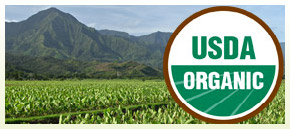Do I Need to Be Certified Organic?
Most farms and businesses that grow, handle, or process organic products must be certified, including:
- Farms and Ranches that sell more than $5,000 in organic products per year (gross sales).
- Handlers that sell more than $5,000 of organic processed food, including handlers that place bulk products into smaller packages or that repackage and/or relabel products.
- Processors that sell more than $5,000 of organic processed products, unless all products contain less than 70 percent organic ingredients or only identify the organic ingredients in the ingredient statement.
- Vendors that handle (e.g. package) and sell products online (but not in stores) or otherwise deliver organic products.
Overall, if you make a product and want to claim that it or its ingredients are organic, your final product probably also needs to be certified. Please review the examples and exemptions below. Overview: Getting Certified | Do I Need to Be Certified Factsheet
I combine multiple certified organic ingredients to make organic granola. Do I need to be certified?
If you wish to make any organic claim on the granola’s principal display panel (front of the package), yes, you must be certified. Organic claims include any use of the word “organic” (alone or referring to specific organic ingredients) or the USDA organic seal. Only products meeting all requirements for the “organic” or the “100 percent organic” labeling categories may use the USDA organic seal anywhere on the package.
If you are only identifying specific organic ingredients in the ingredient statement and aren’t making an organic claim elsewhere, review the “exempt handling operations” section below. a;”>
If you are a retail food establishment, review the “retail food establishments” section below. Learn more about requirements for each labeling category.
Another company packages my product. They have an organic certificate. Do I also have to be certified?
If you are only selling a pre-packaged product, you don’t need to be certified. The company that does the final packaging for your product must be certified and get any organic product label approved prior to sale.
Who does not need to be certified?
- Small organic farms, ranches, and businesses (gross agricultural income from organic sales less than $5,000 per year)
- Brokers, distributors, and traders
- Retail food establishments
- Exempt handling operations (see below)
Although certification is not required for these “exempt” or “excluded” operations, they may pursue voluntary organic certification. Exempt and excluded operations still need to comply with specific sections of the USDA organic regulations as described below.
Small Organic Farms and Businesses
If your farm or business’ gross agricultural income from organic sales does not exceed $5,000 per year, it is considered to be an “exempt” operation. This means you don’t need to be certified in order to sell, label, or represent your products as organic. You also do not need to develop a written organic system plan. However, you must follow all other requirements in the USDA organic regulations. Specifically:
- You must maintain records for at least three years.
- You may not use the USDA organic seal on your products or refer to them as certified organic. If you would like to use the USDA organic seal, you must obtain organic certification.
- You must meet other USDA organic labeling requirements USDA Organic Labeling Regulations
- You may not sell your products as ingredients for use in someone else’s certified organic product.
- If your operation is based in California, you must still register with the California Department of Food and Agriculture.
Brokers, Distributors, and Traders
If your operation only sells, transports, stores, receives, or acquires products that are received in and remain in a container without being processed*, it does not need to be certified. An example of such an “excluded” operation would be one that handles boxed organic cereal. However, you must prevent commingling with non-organic products and contact with prohibited substances.
If your operation handles bulk, unpackaged organic products (such as cattle, milk, or grain), you need to be certified or be included under an organic producer or handler’s organic system plan. Handling Bulk Unpackaged Organic Products
Retail Food Establishments
If your operation is a retail food establishment, such as a grocery store, it does not need to be certified. You may sell certified organic products that bear the USDA organic seal, as long as you don’t process* them. If your retail food establishment processes* certified organic products on its premises, the USDA organic regulations state that you must:
- Prevent commingling with non-organic products and contact with prohibited substances.
- Not use the USDA organic seal or refer to processed products as certified organic. If you would like to use the USDA organic seal, you must obtain organic certification
- Meet the USDA organic labeling requirements Overview | USDA organic labeling regulations
Exempt Handling Operations
If your handling operation:
- Only handles products that contain less than 70 percent organic ingredients (excluding salt and water) or
- Only identify organic ingredients on the product’s information panel,
- Prevent commingling with non-organic products and contact with prohibited substances.
- Not use the USDA organic seal and meet other USDA organic labeling requirements. If you would like to use the USDA organic seal, you must obtain organic certification. Overview | USDA organic labeling regulations
- Maintain records for at least three years that prove that the quantity of organic products sold were organically produced and handled.
It does not need to be certified. However, the USDA organic regulations state that you must:
*Processing: Cooking, baking, curing, heating, drying, mixing, grinding, churning, separating, extracting, slaughtering, cutting, fermenting, distilling, eviscerating, preserving, dehydrating, freezing, chilling, or otherwise manufacturing and includes the packaging, canning, jarring, or otherwise enclosing food in a container. Source: USDA organic regulations




